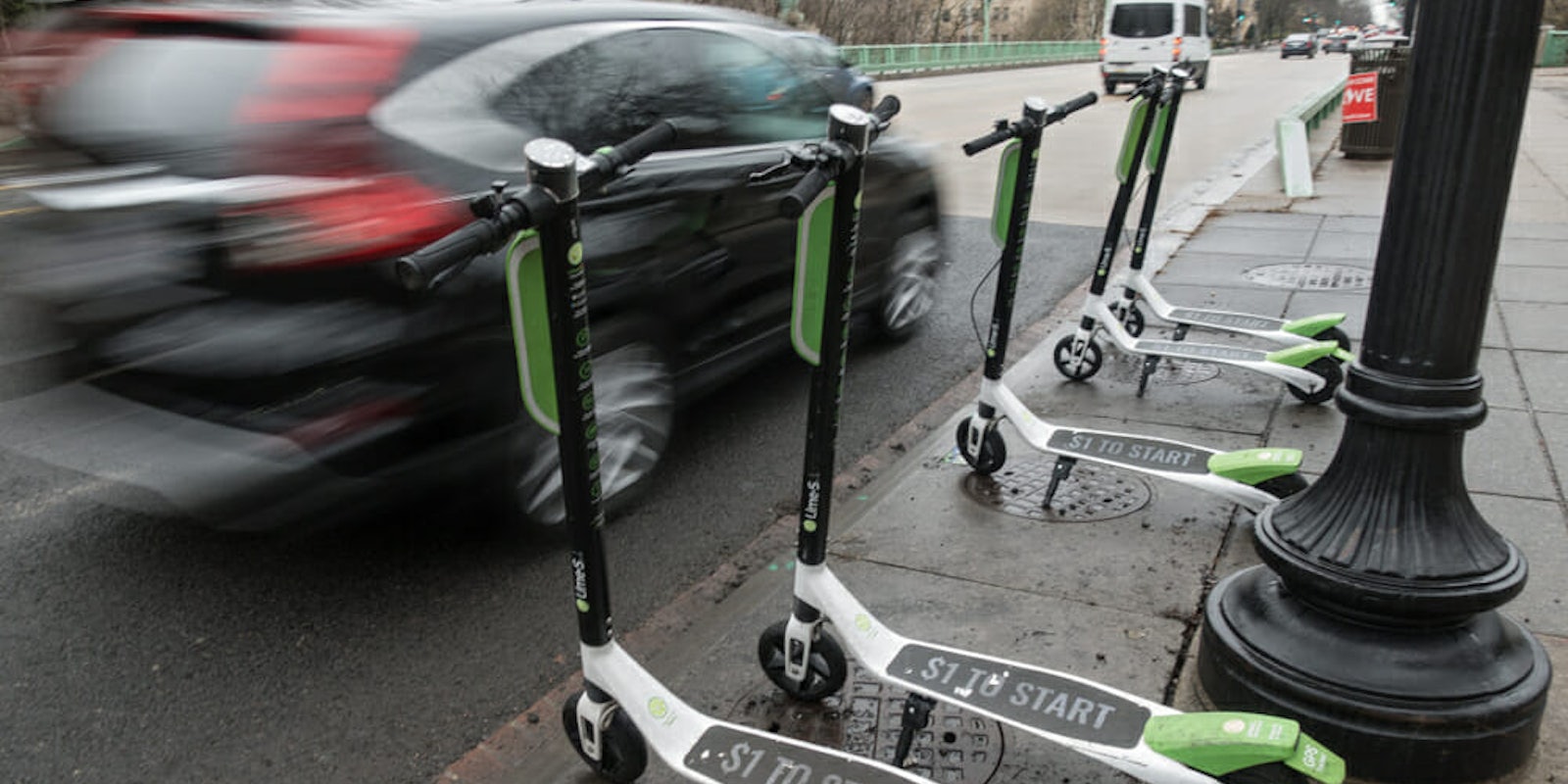Opinion
Electric scooters have taken over the sidewalks of urban areas across the country. As the scooters seem to endlessly multiply, and companies like Lyft and Uber are getting in on the action, residents of these cities are asking an important question: What responsibilities do these companies have to the places in which they operate and the people who live there?
This question has come to Los Angeles’ courthouse steps with filing of a new lawsuit this month—and the repercussions could change transportation in America’s cities.
Last week, nine plaintiffs brought a class-action lawsuit against Bird and Lime (the two most prominent scooter companies in the city, and in the U.S.) in the Los Angeles Count Superior Court alleging they were injured or harmed due to “gross negligence.” The plaintiffs include both scooter riders and pedestrians who have endured injuries ranging from broken wrists to face lacerations. The class is being handled by personal-injury lawyer Catherine Lerer of the Santa Monica firm McGee, Lerer, and Associates.
In addition to the claims relating to injury, the suit also alleges that the scooters contain defective electronics and mechanical parts and inadequate safety instructions. Additionally, the filing argues that the company keeps vehicles on the street beyond when they are actually suitable for public use.
The suit also speaks to a larger issue, one that is about the ownership and use of public space. Lerer’s filing highlights the fact that scooters are stored on sidewalks during the day, which she contends is a violation of the California Civil Code. According to the filing, “dumping” scooters on public streets without an appropriate warning constitutes a “public nuisance.”
The suit speaks to a central tension that is playing out in cities across the country.
While these scooters make transportation better for some, they are making life difficult for others. Someone with a disability may not be able to negotiate a blocked sidewalk. An elderly pedestrian’s experience could be changed by a sidewalk crowded with Bird scooters. A sidewalk filled with scooters leaves room for little else.
Bird has noted that “there is no evidence that riding an e-scooter presents a greater level of danger to riders than riding a bike,” and that “cars remain the greatest threat to commuters.” While this all may be true, a key difference between these e-scooter companies and other modes of transportation is the use of the public sidewalk as the conduit for their private business involving vehicles owned by the company. As such, they have the benefit of controlling the use of urban infrastructure without the responsibilities and oversight of public transportation. Compared to existing private companies that utilize public infrastructure like taxi companies, the scooters are relatively unregulated.
In the case of privately owned cars and bikes, individuals own vehicles, and must adhere to the laws of the road as voted on by other vehicle owners. In the case of public transportation, the state provides transportation options that are designed in concert with one another to the benefit of the city. Electric scooters being run by a few private companies creates the opportunities for resisting regulations and for lobbying for laws that are for the corporate good rather than the public good. Furthermore, a scooter industry more closely aligned with government could help create a safer, more regulated ridership and reduce some of the injuries like those outlined in the suit.
Contrast companies Bird and Lime with L.A.’s Metro Bike Share. Metro Bike Share is a public transportation program that provides bicycle access to the people of Los Angeles. This setup allows the city to build infrastructure and stress safety. As it states online, the “Metro Bike Share station network provides about twice as many bike parking spaces—or what we refer to as ‘dock points’—as there are bikes.” The city is also aware of the number of bikes and where they are stored, and can manage the bikes in concert with the broader infrastructure of the city. Bike stations are often set up right outside of Metro subway stations.
Rather than banning private scooters and launching a city-run program, Los Angeles has decided to attempt to regulate them. The L.A. city council has limited the number of electric scooters in the city to 3,000, a 15 mph speed limit, insurance requirements, and a demand that scooters don’t block sidewalks. Given the wide-ranging issues outlined in the lawsuit, it is up for debate whether these regulations will be effective.
Less than a month before these regulations were imposed, Bird and Lime deactivated their scooters for one day in protest of some earlier decisions from the city council. This kind of option in the hands of private enterprise is a great example of the challengers—and even dangers—that a privately held duopoly can have regarding community infrastructure. Bird has also earned hefty fines from Santa Monica for taking an “ask forgiveness not permission” stance toward local laws. Moves like this leave one wondering if as scooters increase in number these companies might grow more confidence in shirking regulations.
In the court of public opinion, companies like Bird tend to present their model as the only one that that can provide a solution to the pollution caused by automobiles. In a statement released this week, Bird said, “We believe that the climate crisis and our car dependency demand a transportation mode shift, and clean energy vehicles like e-scooters are already replacing millions of short car trips.”
While reducing pollution is certainly an admirable aim, it’s possible to reduce pollution while still allowing citizens a say in how their urban spaces are used. If the argument for electric scooters is one of civic interest, then perhaps we ought to think about building a scooter company the exists solely to promote the civic interest.
It might be nice if the injured parties get some money, but it might have been better if there was an urban environment that could prevent these injuries in the first place.


